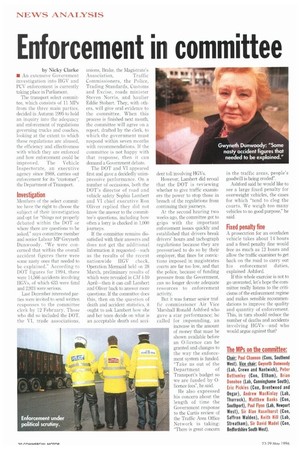Enforcement in committee
Page 22

If you've noticed an error in this article please click here to report it so we can fix it.
by Nicky Clarke • An extensive Government investigation into HGV and PCV enforcement is currently taking place in Parliament.
The transport select committee, which consists of 11 MPs from the three main parties, decided in Autumn 1995 to hold an inquiry into the adequacy and enforcement of regulations governing trucks and coaches, looking at the extent to which these regulations are abused. the efficiency and effectiveness with which they are enforced and how enforcement could be improved. The Vehicle Inspectorate, an executive agency since 1988, carries out enforcement for its "customer", the Department of Transport.
Investigation
Members of the select committee have the right to choose the subject of their investigation and opt for "things not properly debated within the DOT or where there are questions to be asked," says committee member and senior Labour MP Gwyneth Dunwoody. "We were concerned that within the overall accident figures there were some nasty ones that needed to be explained.'' According to DOT figures for 1994, there were 14,566 accidents involving fIGVs, of which 633 were fatal and 2,924 were serious.
Last December interested parties were invited to send written responses to the committee clerk by 12 February. Those who did so included the DOT, the VI, trade associations, unions, Brake, the Magistrate's Association, Traffic Commissioners, the Police. Trading Standards, Customs and Excise, roads minister Steven Norris, and haulier Eddie Stobart. They, with others, will give oral evidence to the committee. When this process is finished next month, the committee will agree on a report, drafted by the clerk, to which the government must respond within seven months with recommendations. If the committee is not happy with that response, then it can demand a Government debate.
The DOT and VI appeared first and gave a decidedly unimpressive performance. On a number of occasions, both the DOT's director of road and vehicle safety Sophia Lambert and VI chief executive Ron Oliver replied they did not know the answer to the committee's questions, including how often a lorry is checked in 1.000 journeys.
If the committee remains dissatisfied with their answers and does not get the additional information it requested—such as the results of the recent nationwide HGV check, Operation Mermaid held on 28 March, preliminary results of which were revealed in CM 4-10 April—then it can al Lambert and Oliver back to answer more questions. If the committee does this, then on the question of death and accident statistics, it ought to ask Lambert how she and her team decide on what is an acceptable death and acci
dent toll involving HGVs.
However, Lambert did reveal that the DOT is reviewing whether to give traffic examiners the power to stop those in breach of the regulations from continuing their journeys.
At the second hearing two weeks ago, the committee got to grips with the important enforcement issues quickly and established that drivers break drivers' hours and tachograph regulations because they are pressurised to do so by their employer, that fines for convictions imposed in magistrates courts are far too low, and that the police, because of funding pressure from the Government, can no longer devote adequate resources to enforcement activity.
But it was former senior traffic commissioner Air Vice Marshall Ronald Ashford who gave a star performance; he called for impounding, an increase in the amount of money that must be shown available before an 0-licence can be granted and changes to the way the enforcement system is funded. "Take us out of the Department of Transport's budget so we are funded by 0licence fees", he said.
He also expressed his concern about the length of time the Government response to the Curtis review of the Traffic Area Office Network is taking: "There is great concern in the traffic areas, people's goodwill is being eroded".
Ashford said he would like to see a large fixed penalty for overweight vehicles, the cases for which "tend to clog the courts. We weigh too many vehicles to no good purpose," he said.
Fixed penalty fine
A prosecution for an overladen vehicle takes about 14 hours and a fixed penalty fine would free as much as 12 hours and allow the traffic examiner to get back on the road to carry out his enforcement duties, explained Ashford.
If this whole exercise is not to go unwasted, let's hope the committee really listens to the criticisms of the enforcement regime and makes sensible recommendations to improve the quality and quantity of enforcement. This, in turn should reduce the number of deaths and accidents involving HGVs, -and who would argue against that?
The MPs on the committee:
Chair: Paul Channon (Cons, Southend West). Vice chair: Gwyneth Dunwoody (Lab, Crewe and Nantwich), Peter Bottomley (Con, Eltham). Brian Donohoe (Lab, Cunninghame South). Eric Pickles (Con, Brentwood and Ongar), Andrew MacKinlay (Lab, Thurrock), Matthew Banks (Con, Southport), Paul Flynn (Lab, Newport West), Sir Alan Haselhurst (Con. Saffron Walden), Keith Hill (Lab, Streatham), Sir David Made! (Con, Bedfordshire South West),




















































































































